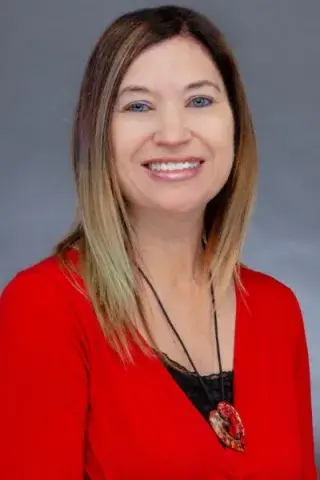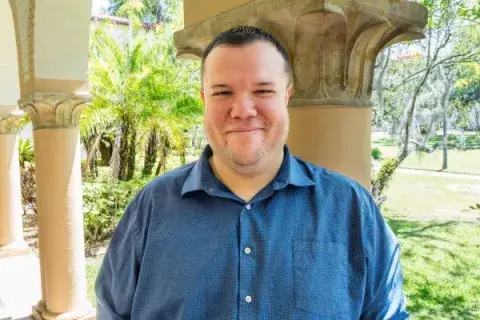Saint Leo Faculty, Career Services Offer ‘Life After College’ Advice
Psychology professor Tammy Zacchilli and director of Career Services Omar Cosme discuss maintaining and building connections, asking for support, and celebrating successes.

Psychology professor Tammy Zacchilli and director of Career Services Omar Cosme discuss maintaining and building connections, asking for support, and celebrating successes.

As college commencement season begins, some students might be worried about their future, or they may be seeking advice from family and friends. Here, Dr. Tammy Zacchilli, professor of psychology, and Omar Cosme, director of Career Services, both at Saint Leo University, offer tips for life after college.

All the Feels
Soon-to-be-graduates are likely feeling positive and negative emotions. “They might feel happy, accomplished, and proud,” Zacchilli said. “They might also experience fear and anxiety if they are not sure where they are headed. Even if they have an idea of where they are headed, they might still have fears related to moving away, starting a new job, or going to graduate school.”
Her advice for graduating students: “They can talk to friends and family members about how they are feeling,” Zacchilli said. “If you experience anxiety that interferes with your daily life, be sure to seek counseling. Sharing feelings can reduce those feelings of anxiety.”
Practical Job Hunt Tips
“Start with what’s within your control,” Cosme advised. “Polish your resume. For Saint Leo students, that’s using our Resume Starter Kit, and then schedule a document review through Handshake.”
Students (and anyone looking for a new career) “should tailor your resume toward the jobs you’re targeting — not just a list of duties, but a story of your skills and accomplishments.”

Cosme recommended using the Handshake platform offered by Saint Leo University or similar platforms used by other colleges. “That’s where you’ll find on-campus jobs, internships, and full-time roles posted by employers actively recruiting Saint Leo students. Complete your profile. The more employers can see about your interests and experiences, the better your chances.”
Another piece of advice from Cosme is to enroll in the Leo Great Career Development Program, which is open to students and alumni. Other universities may offer similar programs. “It walks you through three stages: learning who you are as a professional, getting ready for the job market, and practicing how to stand out,” he said. “Each step is designed to build your confidence and give you practical tools you can use immediately.”
Balancing Self-care with Career
Zacchilli suggests students and graduates should “always take time for yourself.
“Try to use healthy coping strategies,” she said. “Any new path will be met with excitement but also with possible challenges. Don't be afraid to reach out to mentors and past professors if you need additional guidance. Also, stay organized so you can keep track of applications or interviews.”
Family Help
While parents and other family members may be leery of hovering, there are things they can do. “Families can be supportive,” said Zacchilli, the psychology professor. “Families can share stories of their own experiences. Sometimes just listening to our students share their concerns can help them relieve stress.”
Families also can be huge allies in the job hunt process. “The best thing they can do is listen without pressuring,” Cosme said. “Ask open-ended questions like, “What kind of work makes you feel energized?” or “Is there anything you’re curious about exploring?”
Encourage your student to visit Career Services, he said. “The earlier the better, even if they’re unsure of their major or career path.”
Cosme added, “And if you have professional contacts, don’t underestimate the power of a short informational interview. That one conversation might help them discover a field they’d never considered. It’s not about handing them a job — It’s about giving them insight.”
Staying Connected
Social media is a great way to stay connected to friends made while in college. “Texting also allows connection between friends,” Zacchilli said. “When moving from college to a job or graduate school, social support will continue to be important. Try to find people who have similar interests as you.”
Cosme advised new graduates to “stay curious and check in, even if there’s no agenda. Comment on a classmate’s post. Congratulate a friend who just got a new job. Relationships don’t have to fade just because you graduated.”
He also encouraged them to be involved as university alumni through Career Services events, alumni mixers, and online groups. “Many of our Leo Great completers continue to engage through mock interviews, mentoring, or employer panels — because community doesn’t stop at graduation,” he said. “Sometimes, reaching out to someone you haven’t spoken to in a while can be the start of something new. Most people are just waiting for someone else to say hello first.”
Celebrate Success
Some students may be feeling “less than” or are experiencing a bit of “imposter syndrome” this commencement season. “Remind yourself that you were admitted to this university, you’ve done the work, and you’re showing up,” Cosme said. “That’s real. And when you feel like you don’t know enough, get curious instead of critical. Ask questions. Seek feedback. Growth is the goal, not perfection.”
He also suggested keeping a “confidence file.” This could be positive feedback from a professor, a thank-you email from a classmate, or a list of small wins. “When your self-talk turns negative, let those reminders speak louder,” Cosme said.
Zacchilli advised the soon-to-be-graduates to try to avoid comparing themselves too much to others. “You are on your own track, and we each have different experiences,” she said.
“You are a college graduate now so that is a major accomplishment. Be proud of this step and look forward to the new opportunities you will have now that you have completed this step.”